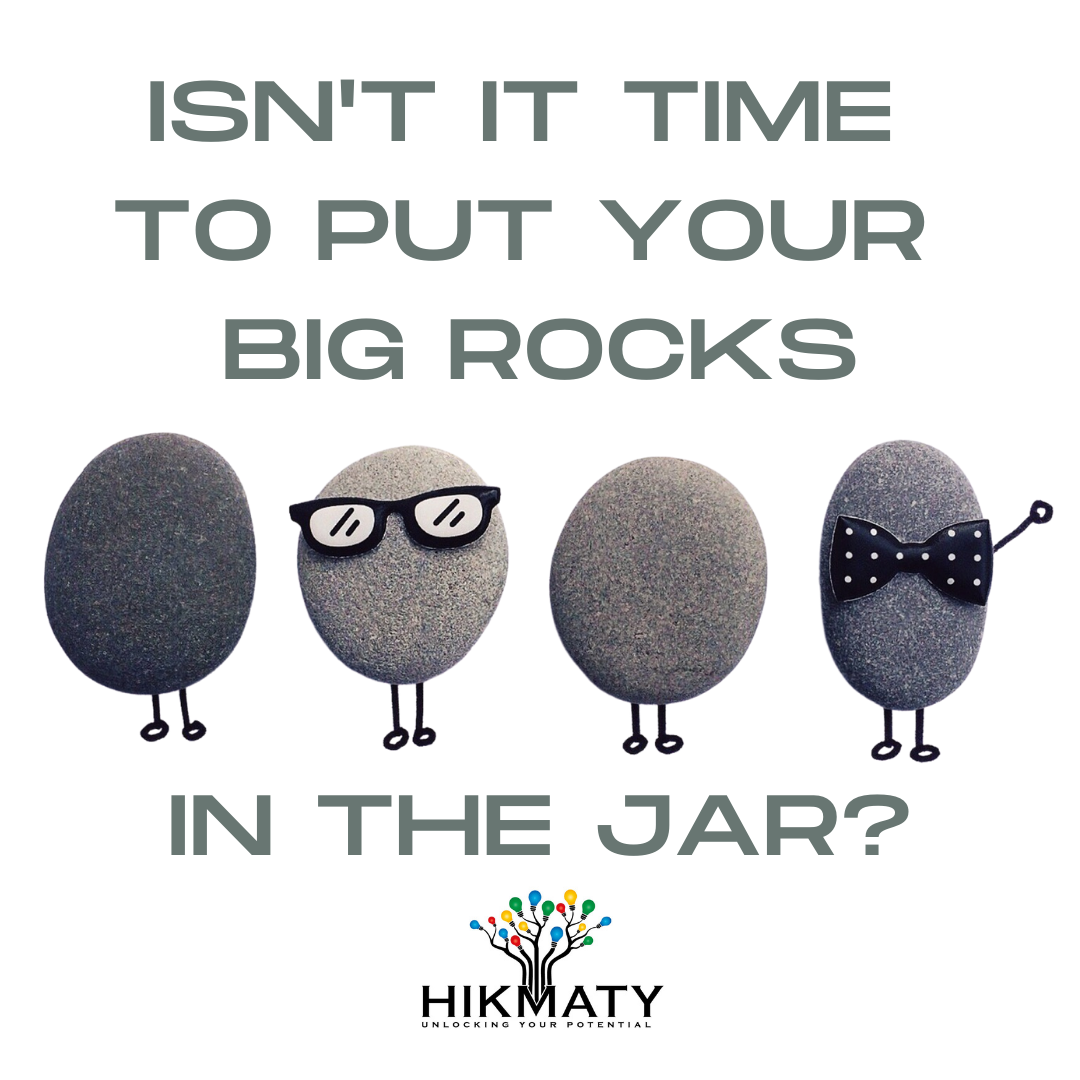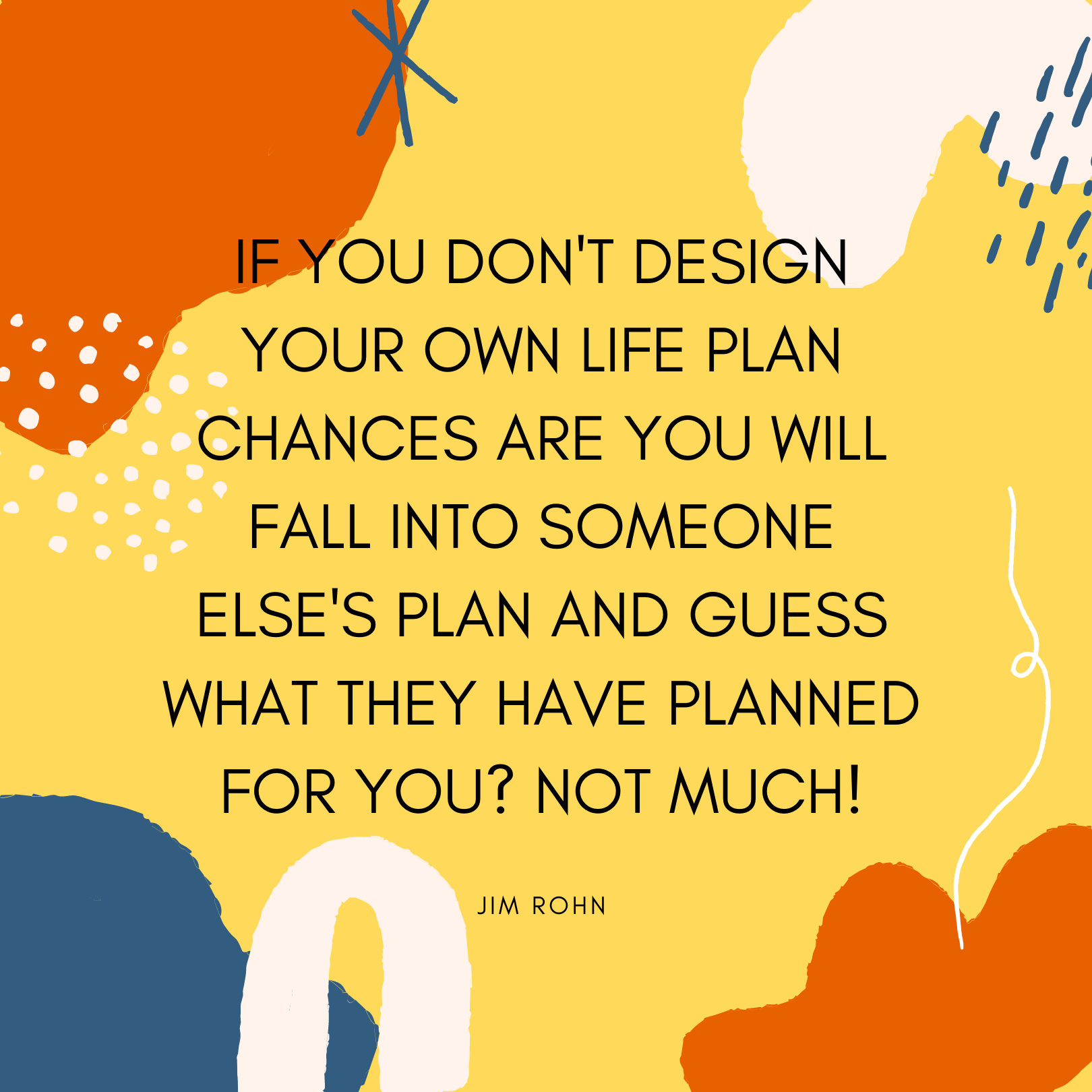Focus on YOUR big rocks first

Stephen Covey of 7 Habits of ‘Highly Effective People popularised this story as part of his ‘Put First Things First’ Habit. The 1989 Classic still sits in bestseller category for all books sold today. Like any classic publication of this calibre there are a lot of timeless gems to learn from.
This is my narrative and interpretation of the story.
The Lecturer entered the Auditorium and placed an extremely large Mason Jar in front of the assembled students. He announced that they were going to talk about productivity, and they would start by conducting a simple experiment.
He took 7 very large stones out of a bag and much to the amusement of his students, spent a few minutes putting them in and taking them out of the jar. Until finally, they all just fitted in snugly and the lid would go on.
He then turned to the students and asked, ‘Is it full?’
The assembled students nodded, and one said “yes”. He paused for a moment and replied “Really?”
He then took a bag of pebbles out and poured these around the larger stones. He shook the jar to allow the pebbles to slip through the larger stones until the jar seemed full again. He put the lid back on.
He then lifted his gaze towards the students and asked, ‘Now is it full?’
The students all laughed. At this point some of them began to understand his intentions more, and someone said, “Apparently not!”. He replied with a grin and “Correct!”.
The students were silent. He then took a large bag of sand out and poured it around the stones and pebbles until they filled up all the spaces between them. He gave the jar a hard tap, just to make sure that now the jar was definitely full and put the lid on.
He then looked at the Students and pointing at the jar asked, ‘Now is it full?’
Without hesitation the entire group said “No!”. And one student added, ‘But it is definitely heavy!’ The Lecturer agreed.
He then reached for the large bottle of water on the table. and poured this into the jar until it was full to the brim and popped the lid back on.
He stepped back, smiled and looked at them all, as they laughed and he exclaimed ‘Now it is full!” and went on to ask “So based upon our productivity theme – what is the moral or lessons from this story?’”.
Linking to the lecture topic one student suggested “We often say the jar is full when it is not. As full on, as our work schedules and lives seem, you can always squeeze something else in.” Another suggested ” Even if, we are saying, we are overwhelmed. The reality is there is always room for more if we arrange the contents of our jars correctly”.
The Lecturer replied by thanking them and suggesting whilst these interpretations seemed to be regularly experienced and talked about in modern life – he had a few other thoughts.
He then delivered a lecture and had a discussion based upon the following themes:
The main principle
The Jar represents everything in your life. The rocks are the priorities. If you do not put all the large stones (or your rocks) in the jar first, you will never be able to fit them in later, without creating a huge mess. And if you take any of them out of the jar, the space will quickly fill up with sand, pebbles and water making it really difficult to get them back in. The stones must always go in first and stay there.
Efficiency over Effectiveness
It also highlights the difference between:
Efficiency – doing lots of things and maybe unwittingly being consumed by busyness.The world of to do lists and measuring quantity over quality.
and
Effectiveness – doing the right things and focusing on what is important. Choosing what matters each day and measuring how what you do contributes to your overall success.
Both are useful but efficiency without effectiveness may not deliver anything meaningful.
The Life Jar Interpretation
The Jar represents your Life and everything in it. The stones or rocks represent the fundamental priorities for a meaningful life – the most important things that have value throughout your life – family, relationships, health, wellbeing and faith. The pebbles are things that matter to you, but they are semi-permanent things that you can live without – they change throughout life – like work, homes, hobbies and friendships. The sand is the minor tasks that fill up your days but do not contribute to your success. And finally, the water is all the distractions that prevent you from getting anything done at all. Realistically they will all be in the jar but those rocks and then pebbles have to be in there first – they are your focus. How is your Life Jar looking?
The Work Jar Interpretation
The Jar is your worklife and career.The term ‘rocks’ is used in business to represent the organisation, team and individual’s goals and priorities. It is about having enjoyable and meaningful work, where you can see the contribution you are making. The rocks are your goals you are measured and rewarded against, pebbles represent your overall role at work, sand is those unimportant busy tasks and meetings; and the water is distractions and other people’s priorities. How is your Work Jar looking?
If you want to bring the idea of rocks into your business language to help people be more productive, check out EOS and their system. The Entrepreneurial Operating System (EOS) is powerful, practical and simple. It is outlined in Gino Wickman’s Book ‘Traction’ and on their website. It describes individual goals as rocks, and is a key component of their productivity system. They have a page of free resources on their website here that explains their approach to everyone having 3 to 7 rock priorities each quarter. If you are an entrepreneur that wants to build and scale a business, by working on as well as in your business – the book, resources and system are worth checking out. Even if the system is not for you – the thinking that surrounds it provides some great business brain food

Other People’s Rocks
It is worth checking out that the rocks and pebbles in your jar are actually yours! Or has a family member or Boss sneaked a few of theirs into your jar.
It is so easy, especially if you feel insecure or are keen to please others, to take on other people’s family and work commitments for them. Your life gets hijacked and that leaves no room in the jar for stuff that matters to you. Most urgencies are simply other people’s priorities. It may even be they continuously dump their sand and water in your jar, so you are focused on cleaning up their mess, while they have time for their priorities.
That is why it is important to OWN your life and career choices, so that other people’s priorities do not hijack your dreams and plans. It is not selfish, as the chances are, that many of your rocks will be about contributing to other people’s lives in ways that make sense to you.
To summarise here are some simple suggestions
- You need to be clear what your life and work priorities or rocks are and keep them front of mind as you plan.
- Are a few rocks missing from the jar? Start afresh with an imaginary empty jar – what would it look like? To achieve this – What do you need to stop, start, do more of and do less of?
- In order to stay productive it is a good idea to be realistic and limit the number of rocks to between 3 and 8.
- If you can integrate the rocks into a planning system you are more likely to focus on them.
- They can seem too big and be more abstract so you may need to chunk into smaller manageable tasks to achieve them.
- Once you identify the big tasks the smaller pebbles can fall in place around them.
- If you spend all your time on urgent, small and insignificant things, you will not have time for rocks or even pebbles. Life may be busy but maybe not very meaningful.
- You need to schedule time for yourself each week to progress rock projects even if you have to book an appointment with yourself.
- Rather than saying ‘I do not have time’ can you reframe to ask, ‘How can I make time to do the stuff that matters to me?’
- You need to create a visual with your rocks on it and keep it close at hand. Look at it every day to remind yourself what meaningful means.
- Rocks are about the destination which is important however do not be so fixated on them that you forget to enjoy the journey. As a 3 year old will tell you – a play in a little bit of sand and water does you no harm.
- Lastly go take a look at Stephen Coveys ‘7 Habits of Highly Effective People’ in book or audible format. Habit 3 is: Put first things first.
Many of you may have heard this story before and you might be looking at this and thinking, it is all obvious – which is only true if you are already living in a meaningful way – with your rocks in that jar first and front of mind. It is easier to say than do – this is simply a reminder to get your rocks in order and in the jar first for a great year!
PLUS
- A QUARTERLY NEWSLETTER focused on practical guidance for using the HIKMATY GRID.
- FREE WEBINARs on key career trends with specialist interviews and HIKMATY GRID transferable skill builders.
- REGULAR UPDATES, COMPETITIONS AND SPECIAL OFFERS on our programs and journals.
- ONCE YOU PURCHASE A PROGRAM you also get access to our PRIVATE Hikmaty Tribe Members Club – for a fresh learning experience.
